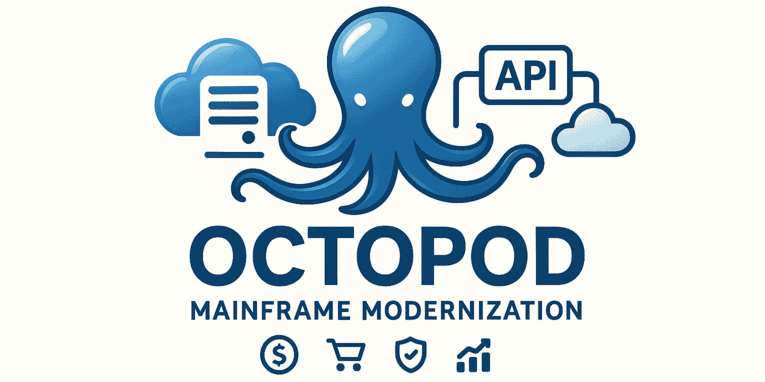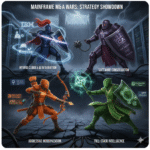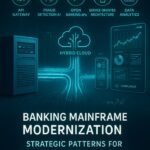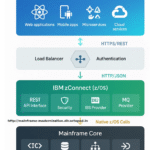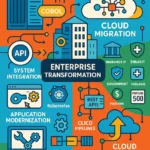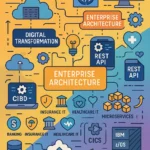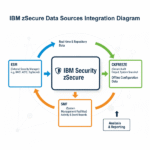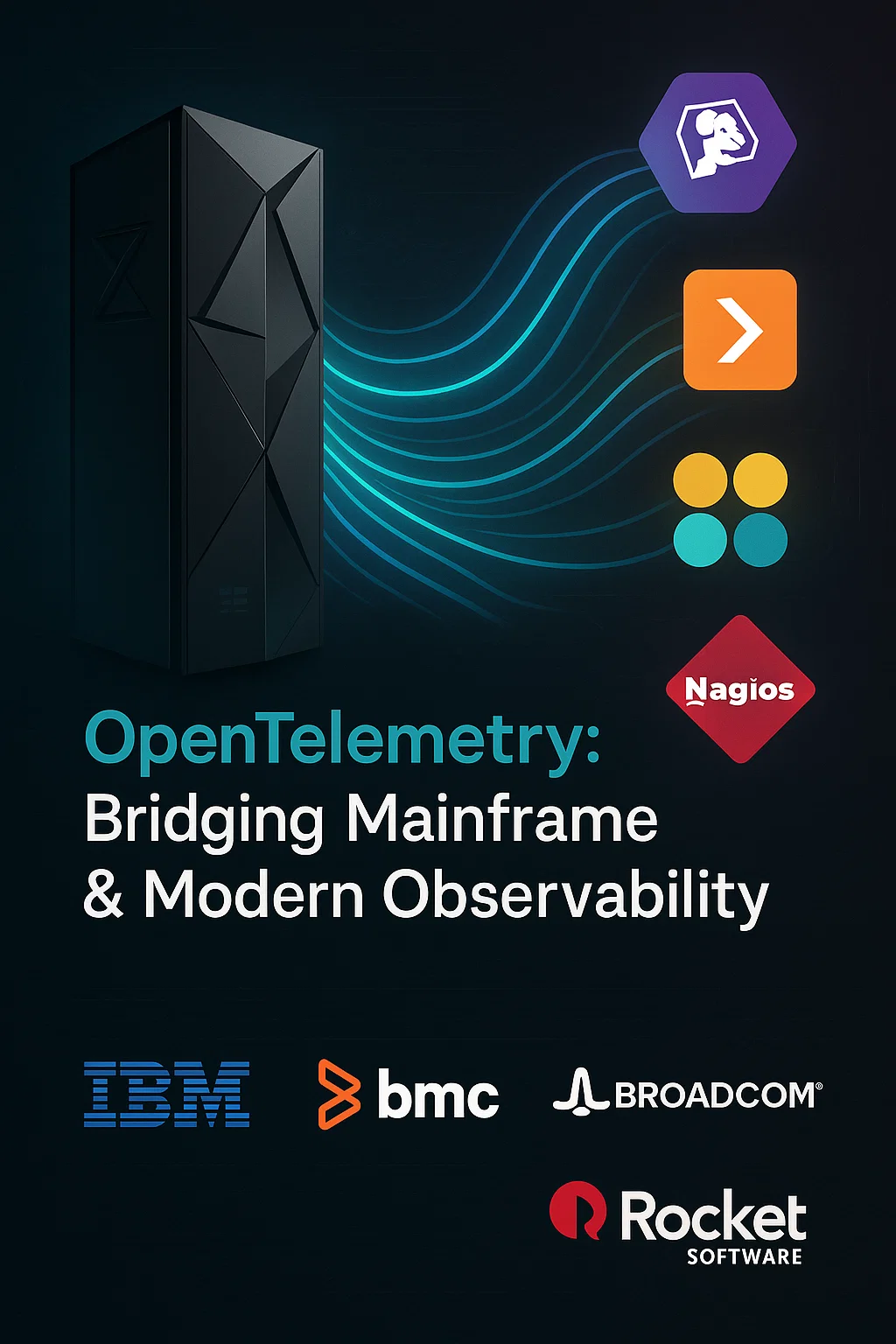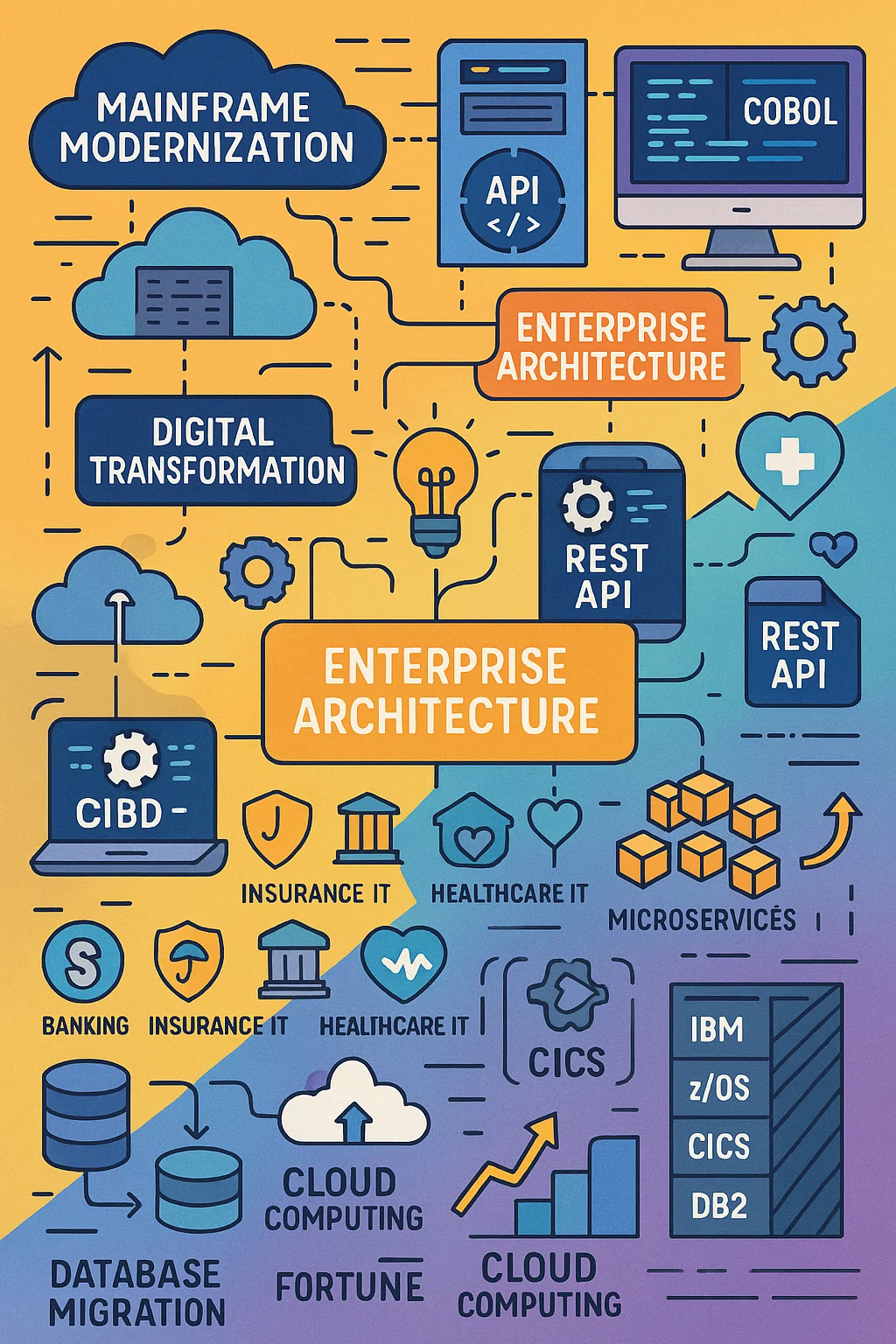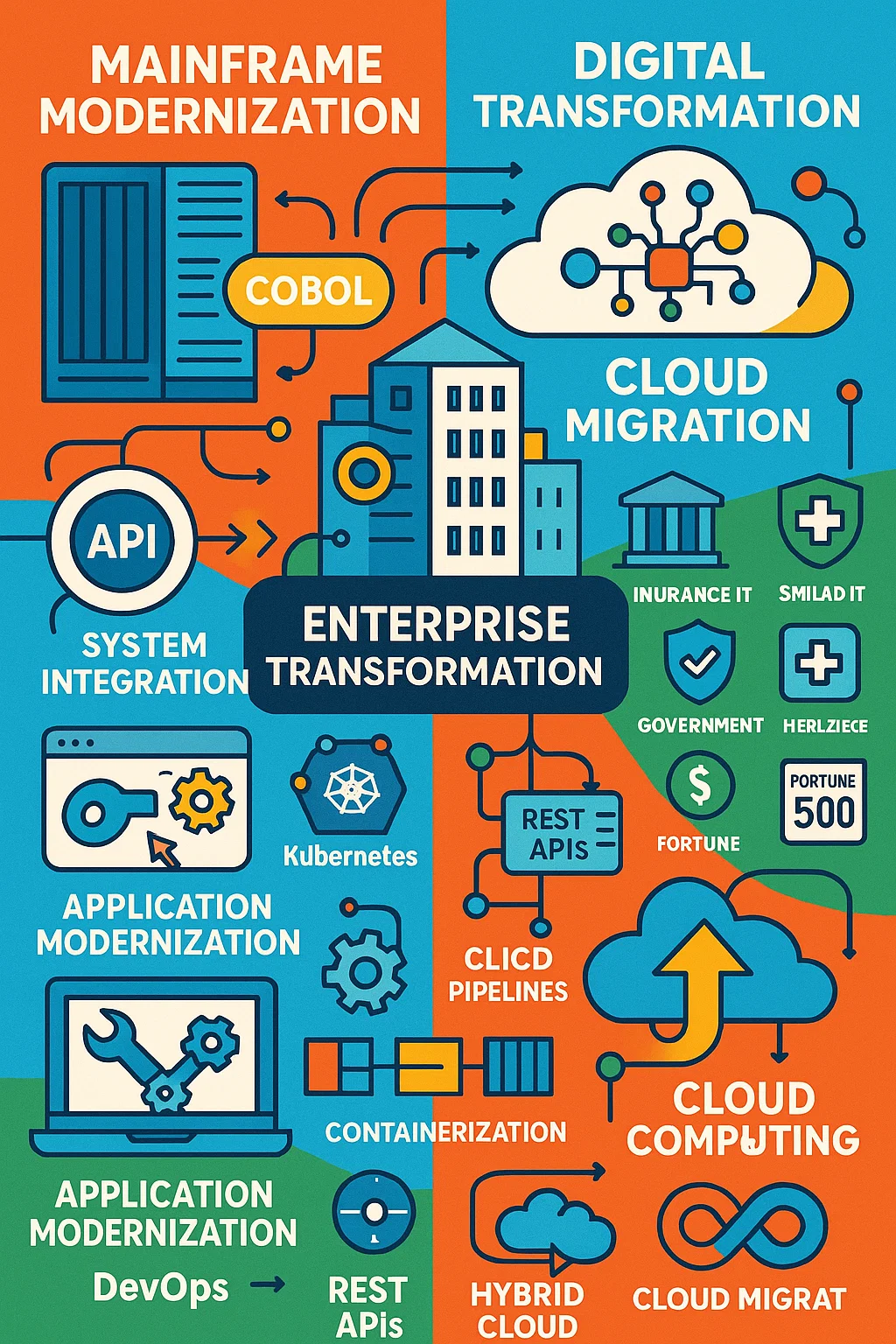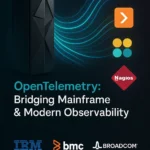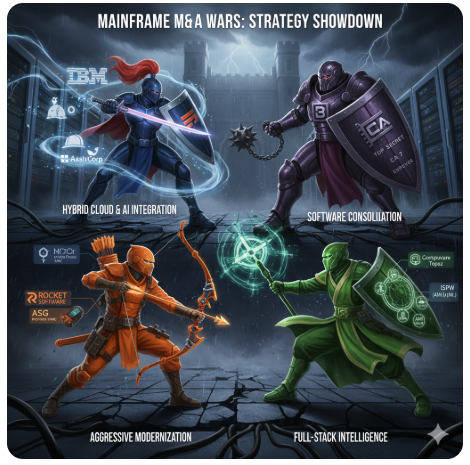Enterprise Platform Modernization Tools
- Enterprise Platform Modernization Tools
- Cloud Migration & Rehosting Solutions
- API Enablement & Integration Tools
- Modern Development & CI/CD Integration
- Data Modernization Solutions
- Open Source & Community Tools
- Specialized Vendor Solutions
- Tool Comparison Matrix
- Modern Development Integration Capabilities
- Project Types & Tool Recommendations
- Cost Optimization Strategies
- Key Takeaways
1. IBM ModernSystems & IBM Z Modernization Stack
Vendor: IBM
Primary Focus: Comprehensive mainframe transformation and optimization
Tools & Components:
- IBM Application Discovery and Delivery Intelligence (ADDI) – Application portfolio analysis
- IBM Z DevOps – Modern development practices for z/OS
- IBM API Connect – Enterprise API management and creation
- IBM Transformation Advisor – Migration planning and assessment
- IBM Z Open Development – Modern IDE for mainframe development
Pros:
✅ Deep mainframe expertise and native integration
✅ Comprehensive ecosystem with end-to-end solutions
✅ Strong enterprise support and consulting services
✅ Maintains data integrity and security
✅ Proven track record with Fortune 500 companies
Cons:
❌ High licensing costs ($500K+ for enterprise implementations)
❌ Vendor lock-in concerns
❌ Complex implementation requiring specialized expertise
❌ Long procurement and deployment cycles
Best For:
- Large enterprises with significant IBM mainframe investments
- Organizations requiring comprehensive transformation strategies
- Projects where maintaining existing IBM ecosystem is preferred
Pricing Model: Enterprise licensing (contact sales)
Implementation Timeline: 12-36 months
2. Micro Focus (OpenText) Enterprise Suite
Vendor: OpenText (formerly Micro Focus)
Primary Focus: Cross-platform application modernization and testing
Tools & Components:
- Enterprise Server – COBOL application rehosting
- Enterprise Developer – Modern IDE for COBOL/PL/I development
- Enterprise Test Server – Mainframe testing in distributed environments
- COBOL Analyzer – Code analysis and documentation
- Visual COBOL – Cloud-native COBOL development
Pros:
✅ Strong COBOL development and testing capabilities
✅ Cloud-native development support
✅ Extensive CI/CD integration options
✅ Lower total cost of ownership than IBM alternatives
✅ Good Azure and AWS integration
Cons:
❌ Limited native z/OS integration
❌ Performance overhead in emulated environments
❌ Learning curve for mainframe developers
❌ Less comprehensive than full IBM stack
Best For:
- Organizations planning to move off z/OS entirely
- Development teams wanting modern tooling for COBOL
- Companies prioritizing cloud-first strategies
Pricing Model: Per-developer licensing + runtime licensing
Implementation Timeline: 6-18 months
Cloud Migration & Rehosting Solutions
3. AWS Mainframe Modernization
Vendor: Amazon Web Services
Primary Focus: Cloud migration and managed modernization services
Tools & Components:
- AWS Mainframe Modernization – Managed service for mainframe workloads
- AWS Application Migration Service – Automated lift-and-shift migration
- AWS Blu Age – Automated code transformation
- AWS Database Migration Service – Data migration tools
- AWS Mainframe Migration Assessment – Portfolio analysis
Pros:
✅ Managed service reduces operational overhead
✅ Pay-as-you-use pricing model
✅ Strong integration with AWS ecosystem
✅ Automated migration tools reduce manual effort
✅ Global availability and scalability
Cons:
❌ Limited support for complex mainframe features
❌ Vendor lock-in to AWS platform
❌ Performance may not match native mainframe for some workloads
❌ Requires significant re-architecting for optimal cloud usage
Best For:
- Organizations with existing AWS infrastructure
- Companies prioritizing operational cost reduction
- Projects with moderate complexity requirements
Pricing Model: Consumption-based + managed service fees
Implementation Timeline: 8-24 months
4. Microsoft Azure Mainframe Migration
Vendor: Microsoft
Primary Focus: Hybrid cloud integration and Windows-based modernization
Tools & Components:
- Azure Migrate – Assessment and migration planning
- Azure Database Migration Service – Data migration tools
- Host Integration Server – Mainframe connectivity
- Visual Studio – Modern development environment
- Azure DevOps – CI/CD for modernized applications
Pros:
✅ Strong enterprise integration capabilities
✅ Excellent .NET and Windows ecosystem integration
✅ Competitive pricing for compute and storage
✅ Good hybrid cloud support
✅ Enterprise security and compliance features
Cons:
❌ Limited native mainframe tooling
❌ Requires significant application rewriting
❌ Less mature mainframe migration tools than competitors
❌ Performance optimization challenges for high-throughput workloads
Best For:
- Microsoft-centric organizations
- Applications that can be rewritten in .NET
- Hybrid cloud scenarios with gradual migration
Pricing Model: Azure consumption + migration service fees
Implementation Timeline: 12-30 months
API Enablement & Integration Tools
5. Zowe Open Source Framework
Vendor: Open Mainframe Project (Linux Foundation)
Primary Focus: Modern interfaces and APIs for z/OS
Tools & Components:
- Zowe API Mediation Layer – API gateway for mainframe services
- Zowe CLI – Command-line interface for z/OS
- Zowe Explorer – VSCode extension for mainframe development
- Zowe Desktop – Web-based mainframe interface
- Zowe Application Framework – Extensible UI framework
Pros:
✅ Open source with no licensing fees
✅ Strong community support and contributions
✅ Modern development experience
✅ Vendor-neutral approach
✅ Active development and regular updates
Cons:
❌ Requires more hands-on configuration and support
❌ Limited enterprise support options
❌ Smaller ecosystem compared to commercial offerings
❌ May require additional tools for complete solution
Best For:
- Organizations wanting vendor-neutral solutions
- Development teams comfortable with open source tools
- Cost-conscious implementations
Pricing Model: Free (open source) + optional support contracts
Implementation Timeline: 3-12 months
6. Software AG webMethods
Vendor: Software AG
Primary Focus: Enterprise integration and API management
Tools & Components:
- webMethods Integration Server – Enterprise integration platform
- webMethods API Gateway – API management and security
- webMethods EntireX – Mainframe connectivity and integration
- webMethods ApplinX – Mainframe application integration
- ARIS – Business process analysis
Pros:
✅ Comprehensive integration capabilities
✅ Strong mainframe connectivity options
✅ Business process modeling integration
✅ Good performance for high-volume transactions
✅ Mature enterprise features
Cons:
❌ Complex setup and configuration
❌ High licensing and maintenance costs
❌ Steep learning curve
❌ Limited modern development tooling
Best For:
- Large enterprises with complex integration needs
- Organizations requiring business process management
- High-volume transaction processing requirements
Pricing Model: Processor-based licensing + support
Implementation Timeline: 9-24 months
Modern Development & CI/CD Integration
7. GitLab with Mainframe Integration
Vendor: GitLab + Partner Ecosystem
Primary Focus: DevOps and CI/CD for mainframe applications
Integration Components:
- GitLab CI/CD – Continuous integration and deployment
- Rocket Git for z/OS – Git integration for mainframe source code
- DBmaestro TeamWork – Database DevOps for DB2
- Compuware ISPW – Source code management for mainframe
- CA Endevor – Change management integration
Pros:
✅ Modern DevOps practices for mainframe development
✅ Version control integration with Git
✅ Automated testing and deployment pipelines
✅ Strong integration ecosystem
✅ Familiar tooling for modern developers
Cons:
❌ Requires multiple vendor integrations
❌ Complex setup for mainframe-specific workflows
❌ Limited native mainframe debugging capabilities
❌ May require cultural change in traditional mainframe shops
Best For:
- Organizations modernizing development practices
- Teams wanting to apply DevOps to mainframe applications
- Companies with mixed mainframe/distributed environments
Pricing Model: Per-user subscription + integration tool costs
Implementation Timeline: 6-18 months
8. Jenkins with Mainframe Plugins
Vendor: Open Source + Commercial Plugin Ecosystem
Primary Focus: Open-source CI/CD with mainframe support
Key Plugins & Integrations:
- zOS Connector Plugin – Job submission and monitoring
- IBM z/OS Batch Builder – Batch job automation
- Compuware Plugins – ISPW and Topaz integration
- CA Harvest/Endevor Plugin – Source code management
- DBmaestro Plugin – Database deployment automation
Pros:
✅ Open source with extensive plugin ecosystem
✅ Highly customizable and flexible
✅ Large community and knowledge base
✅ Cost-effective solution
✅ Good integration with modern tools
Cons:
❌ Requires significant configuration and maintenance
❌ Limited enterprise support
❌ Plugin compatibility and versioning challenges
❌ Security considerations for open source components
Best For:
- Small to medium-sized organizations
- Teams with strong DevOps expertise
- Cost-sensitive projects
Pricing Model: Free (open source) + optional commercial plugins
Implementation Timeline: 3-9 months
9. Broadcom DevOps Solutions
Vendor: Broadcom (formerly CA Technologies)
Primary Focus: Enterprise mainframe DevOps and automation
Tools & Components:
- CA Endevor – Source code and change management
- CA SYSVIEW – Performance monitoring and optimization
- CA AutoSys – Workload automation
- CA Chorus Software Manager – Application lifecycle management
- CA File Master Plus – Data management and testing
Pros:
✅ Comprehensive mainframe DevOps suite
✅ Deep z/OS integration and optimization
✅ Enterprise-grade security and audit capabilities
✅ Strong performance monitoring and analytics
✅ Established mainframe expertise
Cons:
❌ High licensing and maintenance costs
❌ Complex implementation and training requirements
❌ Limited modern UI and user experience
❌ Vendor lock-in concerns
Best For:
- Large enterprises with significant mainframe investments
- Organizations requiring comprehensive audit and compliance
- Teams comfortable with traditional mainframe tooling
Pricing Model: MIPS-based licensing + annual maintenance
Implementation Timeline: 12-30 months
Data Modernization Solutions
10. Informatica PowerCenter & Cloud Data Integration
Vendor: Informatica
Primary Focus: Enterprise data integration and migration
Tools & Components:
- PowerCenter – Enterprise data integration platform
- Cloud Data Integration – Cloud-native ETL/ELT
- Data Quality – Data profiling and cleansing
- Master Data Management – Enterprise data governance
- Mainframe Connectors – VSAM, IMS, DB2 connectivity
Pros:
✅ Comprehensive data integration capabilities
✅ Strong mainframe connectivity options
✅ Enterprise data governance features
✅ Cloud and on-premises deployment flexibility
✅ Proven scalability for large data volumes
Cons:
❌ High licensing costs
❌ Complex setup and configuration
❌ Resource-intensive for large transformations
❌ Steep learning curve for development teams
Best For:
- Large-scale data migration projects
- Organizations with complex data governance requirements
- Enterprises needing comprehensive data quality management
Pricing Model: Processor-based licensing + cloud consumption
Implementation Timeline: 6-18 months
11. Talend Data Integration
Vendor: Talend (Qlik)
Primary Focus: Open-source data integration with enterprise features
Tools & Components:
- Talend Open Studio – Open-source data integration
- Talend Data Integration – Enterprise data integration platform
- Talend Data Quality – Data profiling and cleansing
- Talend Cloud – Cloud-native data integration
- Mainframe Connectors – DB2, VSAM, and sequential file access
Pros:
✅ Open-source foundation with lower costs
✅ Strong community and knowledge base
✅ Good cloud integration capabilities
✅ Flexible deployment options
✅ Modern development environment
Cons:
❌ Limited enterprise support for open-source version
❌ Performance limitations for very large datasets
❌ Fewer advanced features compared to enterprise alternatives
❌ Integration complexity for complex mainframe data structures
Best For:
- Mid-market organizations with moderate data complexity
- Teams comfortable with open-source tools
- Cost-conscious data migration projects
Pricing Model: Open-source free + enterprise subscription
Implementation Timeline: 4-12 months
Open Source & Community Tools
12. COBOL-IT and GnuCOBOL
Vendor: Open Source Community / COBOL-IT
Primary Focus: Open-source COBOL development and execution
Tools & Features:
- GnuCOBOL – Open-source COBOL compiler
- COBOL-IT Developer Studio – IDE for COBOL development
- COBOL-IT Runtime – Production COBOL execution environment
- Migration Tools – Mainframe to distributed system migration
- Cloud Deployment – Container and cloud-native deployment
Pros:
✅ No licensing fees for open-source components
✅ Cross-platform COBOL execution
✅ Modern development environment
✅ Good cloud and container support
✅ Active community development
Cons:
❌ Limited enterprise support options
❌ Compatibility issues with complex mainframe COBOL features
❌ Performance overhead compared to native mainframe execution
❌ Limited ecosystem of supporting tools
Best For:
- Small to medium-sized COBOL applications
- Organizations wanting to eliminate mainframe hardware costs
- Educational and development environments
Pricing Model: Open source free + commercial support options
Implementation Timeline: 3-8 months
13. Hercules Mainframe Emulator
Vendor: Open Source Community
Primary Focus: Mainframe hardware emulation
Capabilities:
- System/370, ESA/390, z/Architecture emulation
- Multiple operating system support (MVS, z/OS, Linux)
- Development and testing environments
- Educational and research applications
- Small production workloads
Pros:
✅ Free and open source
✅ Good for development and testing
✅ Educational value for mainframe concepts
✅ Cross-platform compatibility
✅ Active community support
Cons:
❌ Not suitable for production enterprise workloads
❌ Limited performance compared to real mainframes
❌ No enterprise support or warranties
❌ Complexity in setup and configuration
❌ Legal considerations for IBM software licensing
Best For:
- Development and testing environments
- Educational institutions
- Small-scale experimentation
- Legacy application preservation
Pricing Model: Free (open source)
Implementation Timeline: 1-3 months
Specialized Vendor Solutions
14. Rocket Software Modernization Suite
Vendor: Rocket Software
Primary Focus: Mainframe optimization and modernization tools
Tools & Components:
- Rocket ChangeMan ZDD – Zero downtime deployment
- Rocket BlueZone – Terminal emulation and modernization
- Rocket Data – Database and data management tools
- Rocket API – API creation and management
- Rocket Security – Mainframe security solutions
Pros:
✅ Specialized mainframe expertise
✅ Incremental modernization approach
✅ Strong security and compliance features
✅ Good performance optimization tools
✅ Established customer base
Cons:
❌ Limited cloud-native capabilities
❌ Smaller ecosystem compared to major vendors
❌ Niche market focus may limit integration options
❌ Higher per-unit costs for specialized tools
Best For:
- Organizations wanting to optimize existing mainframe investments
- Incremental modernization projects
- Security-focused mainframe environments
Pricing Model: Module-based licensing + maintenance
Implementation Timeline: 6-15 months
15. LzLabs Software Defined Mainframe
Vendor: LzLabs
Primary Focus: Mainframe rehosting without code changes
Core Technology:
- Software Defined Mainframe (SDM) – Mainframe OS emulation
- Container-based deployment – Cloud-native architecture
- Binary compatibility – Run mainframe applications unchanged
- Integrated middleware – Database and messaging services
- Management and monitoring – Cloud operations tools
Pros:
✅ No application code changes required
✅ Container-based cloud deployment
✅ Significant cost reduction potential
✅ Modern operations and monitoring
✅ Good performance characteristics
Cons:
❌ Relatively new technology with limited proven deployments
❌ High implementation complexity
❌ Dependency on vendor for ongoing support
❌ Limited ecosystem of supporting tools
❌ Integration challenges with some mainframe features
Best For:
- Organizations wanting to eliminate mainframe hardware costs
- Applications that can’t be easily refactored
- Companies comfortable with newer technology vendors
Pricing Model: Subscription + professional services
Implementation Timeline: 12-24 months
Tool Comparison Matrix
CategoryTool/VendorCostComplexityCloud ReadyModern DevOpsEnterprise SupportEnterprise PlatformIBM ModernSystemsVery HighHighModerateGoodExcellentMicro FocusHighModerateExcellentExcellentGoodCloud MigrationAWS Mainframe ModernizationModerateModerateExcellentGoodGoodAzure MigrationModerateModerateExcellentExcellentGoodAPI EnablementZoweLowModerateGoodExcellentLimitedSoftware AG webMethodsHighHighModerateLimitedExcellentCI/CD IntegrationGitLab + PartnersModerateModerateExcellentExcellentGoodJenkins + PluginsLowHighGoodExcellentLimitedBroadcom DevOpsVery HighHighLimitedModerateExcellentData IntegrationInformaticaHighModerateGoodModerateExcellentTalendLow-ModerateModerateExcellentGoodModerateOpen SourceGnuCOBOL/COBOL-ITLowModerateGoodGoodLimitedHerculesFreeHighLimitedLimitedNoneSpecializedRocket SoftwareModerateModerateLimitedLimitedGoodLzLabs SDMHighHighExcellentModerateLimited
Modern Development Integration Capabilities
CI/CD Pipeline Integration
Most modern mainframe modernization tools now support integration with popular CI/CD platforms:
Supported CI/CD Tools:
- GitLab CI/CD – Full pipeline automation with mainframe-specific runners
- Jenkins – Extensive plugin ecosystem for mainframe integration
- Azure DevOps – Microsoft-native pipeline with mainframe connectors
- GitHub Actions – Custom actions for mainframe deployment and testing
- TeamCity – JetBrains CI/CD with mainframe build agents
- Bamboo – Atlassian CI/CD with custom mainframe integrations
Integration Capabilities:
✅ Source code management – Git integration for COBOL, PL/I, JCL
✅ Automated builds – Compilation and link-editing in CI pipelines
✅ Testing automation – Unit testing, integration testing, performance testing
✅ Deployment automation – Zero-downtime deployment to mainframe environments
✅ Monitoring integration – Performance monitoring and alerting in DevOps workflows
Project Types & Tool Recommendations
API Modernization Projects
Recommended Stack:
- Primary: Zowe API Mediation Layer + IBM API Connect
- Alternative: Software AG webMethods + Custom Development
- CI/CD: GitLab CI/CD + Rocket Git for z/OS
- Monitoring: Dynatrace + IBM Z APM Connect
Cloud Migration Projects
Recommended Stack:
- Primary: AWS Mainframe Modernization + Micro Focus Enterprise Server
- Alternative: Azure Migration + .NET Conversion
- Development: Visual Studio Code + Zowe Explorer
- Data: AWS Database Migration Service + Talend
DevOps Transformation Projects
Recommended Stack:
- Source Control: Git + Rocket Git for z/OS or IBM Git for z/OS
- CI/CD: Jenkins + Mainframe Plugins or GitLab + Custom Integrations
- Testing: Micro Focus Enterprise Test Server + Selenium
- Deployment: Ansible + Broadcom Endevor or Rocket ChangeMan
Data Modernization Projects
Recommended Stack:
- ETL/ELT: Informatica PowerCenter + Cloud Data Integration
- Alternative: Talend + Custom Connectors
- Data Quality: Informatica Data Quality + Custom Validation
- Analytics: Snowflake + dbt + Tableau
Cost Optimization Strategies
Open Source First Approach
- Start with Zowe for API enablement and modern interfaces
- Use Jenkins for CI/CD with custom mainframe plugins
- Implement GnuCOBOL for development and testing environments
- Leverage Hercules for training and development
Hybrid Commercial Approach
- IBM tools for critical production systems
- Open source tools for development and testing
- Cloud services for scalable compute and storage
- Third-party tools for specialized capabilities
Total Cost of Ownership Considerations
- Licensing costs – Annual maintenance typically 20-22% of initial license
- Implementation services – 2-5x software costs for complex projects
- Training and certification – $10-50K per developer for specialized training
- Ongoing support – 15-25% of annual IT budget for modernized environments
Key Takeaways
- No single tool solves all modernization challenges – Success requires a carefully selected toolchain
- Open source options provide cost-effective starting points but require more hands-on expertise
- Enterprise vendors offer comprehensive solutions but at significantly higher costs
- Cloud platforms provide good middle-ground options with managed services and flexible pricing
- Modern DevOps integration is becoming table stakes for any modernization initiative
- Start small and scale gradually – Pilot projects help validate tool choices before major investments
The mainframe modernization landscape continues to evolve rapidly, with new tools and approaches emerging regularly. The Open Mainframe Project continues to drive innovation in open-source solutions, while cloud providers like AWS have been recognized as leaders in mainframe modernization software. Success depends on selecting the right combination of tools that match your organization’s technical requirements, budget constraints, and strategic objectives.
